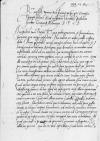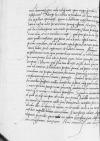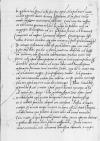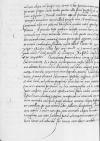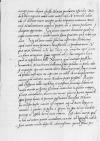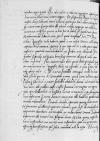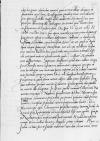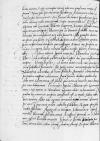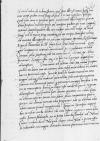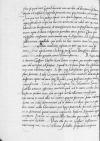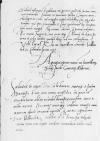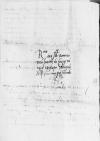Accepi ⌊⌋ tuas, Praesul Reverendissime, quae mihi gratiores et iucundiores fuerunt, quo magis expectatae. His ordine, ut videre velle, respondebo. Primo quod ⌊Isabellam⌋ socrum adscribed in place of crossed-out s⌈smm adscribed in place of crossed-out s⌉ incusas ad tuas litteras connivisse ⌊filiam⌋que vendere voluisse et reliqua, quae de
multis criminibus unum reprehendis, nihil ad me attinent, qui contemplatione tui omnia candido sinceroque animo agebam, non ex compacto, ut tu reris. Quasi ⌊illi⌋ suasissem, ne tibi petenti ⌊filia⌋ redderetur et alia, quae ego ne per somnium quidem cogitavi, persancte iuro, tantum abest, ut facerem. Hoc item contestatum vellens, me nullas hactenus litteras tuas vidisse praeter ⌊⌋ ultimas, quae ⌊socrui⌋ redditae sunt triduo ante ⌊⌋, quibus aliud fortasse astu agens, alienam ⌊filiam⌋ tuam dicebas. Quod ⌊socrus⌋ iniquo
animo accipiens indignatione rei percussa, flens obtestansque, dum se de hoc
apud me expurgaret, iussi illam aequanimem esse, cum vel a me uno falsum hoc convinceretur, qui citius
deieraturus eram me non esse Gratianum, illam autem Isabellam, quam ⌊puellam⌋
tuam non esse filiam, adeo iudicio omnium, qui te noramus, non solum facie gestu incessu et reliquis corporis lineamentis, sed mehercle moribus sermone etiam te refert.
Proinde huius rei secura, cetera ad ⌊Germanos⌋[1] referret, quibus cum ego insciis ⌊matre⌋ et ⌊filia⌋ coniugium hoc ante tractabam, ad quod iam inde a principio ab ipsismet Germanis instigatus et allectus fueram. Qua de re Deum Optimum Maximum cf. Vulg. Sap 1.6 Benignus est enim spiritus sapientiae, et non liberabit maledicum a labiis suis, quoniam renum illius testis est Deus, et cordis illius scrutator est verus, et linguae eius auditor ⌊scrutatorem cordis et  UUB, H.154, f. 165v
renumcf. Vulg. Sap 1.6 Benignus est enim spiritus sapientiae, et non liberabit maledicum a labiis suis, quoniam renum illius testis est Deus, et cordis illius scrutator est verus, et linguae eius auditor ⌋
hominesque ipsos mihi tibique notos opere magis, quam verbis, sum testificatus. Nempe haec omnia eo tendunt, ut dicas assensu tuo exspectato oportuisse. Quem si hactenus exspectassemus, priusquam litterae nostrae ad te pervenissent, priusquam responsum et
assensum, quem dicis, habuissemus, iam ⌊mater⌋ perditissima ⌊filiam⌋ perdidisset, si non
alias, at certe moribus corruptis, cum praecipue in ea esset aetate puella
constituta, quae possit vel ad vitia apud matrem pessime moratam, vel ad
virtutes apud optimam ⌊socrum⌋, qualem nunc habet, facile informari et habitum sumere.
Alioquin exspectaturus eram aequo animo hunc consensum, si recte memini per
meas primas ⌊⌋ abs te petitum, quas trinis exemplis fateris accepisse, maxime cum ⌊filia⌋ tua id esset aetatis tunc, quae me non ad amorem et libidinem propter formam, sed potius ad misericordiam sui propter pietatem Christianam paternamque amicitiam simplicitatemque morum invitare potuisset. Quibus tantum, dum modis
omnibus prospicio, nullis sumptibus peperci idque cum vilius a ⌊matre⌋
pessima pauperrima pecuniaeque avidissima in concubinam emere, quam in coniugem
redimere potuissem. Siquidem invitus dicam id, quod ab aliis accipies ab eo die, quo
primum ⌊Isabellae⌋ socrus hospes domum sum ingressus, mille
fere ducatorum sumptus feci in alendis illis, in
ducenda ⌊uxore⌋, in elocanda socru a me tantum vestibus,
suppellectilibus, utensilibus et necessariis adiuta,
aliisque expensis faciendis, quas mihi me subire
necessum fuit cupienti tuo meoque honori satisfacere. Hinc nimirum est aut
nusquam ali
UUB, H.154, f. 165v
renumcf. Vulg. Sap 1.6 Benignus est enim spiritus sapientiae, et non liberabit maledicum a labiis suis, quoniam renum illius testis est Deus, et cordis illius scrutator est verus, et linguae eius auditor ⌋
hominesque ipsos mihi tibique notos opere magis, quam verbis, sum testificatus. Nempe haec omnia eo tendunt, ut dicas assensu tuo exspectato oportuisse. Quem si hactenus exspectassemus, priusquam litterae nostrae ad te pervenissent, priusquam responsum et
assensum, quem dicis, habuissemus, iam ⌊mater⌋ perditissima ⌊filiam⌋ perdidisset, si non
alias, at certe moribus corruptis, cum praecipue in ea esset aetate puella
constituta, quae possit vel ad vitia apud matrem pessime moratam, vel ad
virtutes apud optimam ⌊socrum⌋, qualem nunc habet, facile informari et habitum sumere.
Alioquin exspectaturus eram aequo animo hunc consensum, si recte memini per
meas primas ⌊⌋ abs te petitum, quas trinis exemplis fateris accepisse, maxime cum ⌊filia⌋ tua id esset aetatis tunc, quae me non ad amorem et libidinem propter formam, sed potius ad misericordiam sui propter pietatem Christianam paternamque amicitiam simplicitatemque morum invitare potuisset. Quibus tantum, dum modis
omnibus prospicio, nullis sumptibus peperci idque cum vilius a ⌊matre⌋
pessima pauperrima pecuniaeque avidissima in concubinam emere, quam in coniugem
redimere potuissem. Siquidem invitus dicam id, quod ab aliis accipies ab eo die, quo
primum ⌊Isabellae⌋ socrus hospes domum sum ingressus, mille
fere ducatorum sumptus feci in alendis illis, in
ducenda ⌊uxore⌋, in elocanda socru a me tantum vestibus,
suppellectilibus, utensilibus et necessariis adiuta,
aliisque expensis faciendis, quas mihi me subire
necessum fuit cupienti tuo meoque honori satisfacere. Hinc nimirum est aut
nusquam ali UUB, H.154, f. 166rbi, quod ⌊filiam⌋ tuam sponsam mihi fere per annum et apud ⌊matrem⌋ meam in ⌊vico⌋ agentem ducere de more distulerim et in facie ecclesiae modis
legitimis matrimonium celebrare. Quod iam Deo auspice, ut
tibi morem gererem, in vico ⌊Pozaldes⌋ in publica
ecclesia magnifice et sumptuose ad XI Calendas Iunias
celebravimus convocatis ad nuptias ⌊Germanis⌋[2] aliquot, consanguineis
affinibus et amicis omnibus atque adeo universo populo, quantuluscumque est.
De coniugis institutione nihil est, quod labores, cum iam
inde a festo Divi Petri, quo die a domo materna abducta ad hospitium
⌊Fucherorum⌋, ubi sponsalia celebravimus, tradita ⌊matri⌋ meae fuerit sitque apud illam perpetuo in ⌊vico⌋, ne latum quidem pedem quoque discedens. ⌊Quae⌋
ab eadem ad omnes actus vitae honestissimos informata per omnia ⌊socrum⌋ aemulari studet. Qua de re ⌊mater⌋ mea ad te latissime ⌊⌋ et in praesentiarum
⌊⌋. Sed quoniam tibi non iniucundum auditu fore arbitror, accipe quibus exercitiis ⌊filia⌋ tua apud ⌊matrem⌋ meam diem transigat. Mane simul atque experrecta est vel a ⌊matre⌋ apud quam dormit excitata, id fit ad sextam fere, surgit e lecto genibusque flexis ante altare, quod in cubili habet, agit gratias benignitati Divinae pro beneficiis in se collatis preculas aliquot ore iaculans. Postea a ⌊matre⌋ compta et ornata incipit recitare in horis Officium Divae Virginis ad illam horam, qua pulsatis de more nolis ad sacrum vocantur. Tunc ⌊mater⌋ et ⌊ipsa⌋ p templum petunt rebus sacris operam daturae, a quibus illae totum diem felicem auspicantur. Domum reversa sumit ientaculum, inde ad munia domestica obeunda se confert,
UUB, H.154, f. 166rbi, quod ⌊filiam⌋ tuam sponsam mihi fere per annum et apud ⌊matrem⌋ meam in ⌊vico⌋ agentem ducere de more distulerim et in facie ecclesiae modis
legitimis matrimonium celebrare. Quod iam Deo auspice, ut
tibi morem gererem, in vico ⌊Pozaldes⌋ in publica
ecclesia magnifice et sumptuose ad XI Calendas Iunias
celebravimus convocatis ad nuptias ⌊Germanis⌋[2] aliquot, consanguineis
affinibus et amicis omnibus atque adeo universo populo, quantuluscumque est.
De coniugis institutione nihil est, quod labores, cum iam
inde a festo Divi Petri, quo die a domo materna abducta ad hospitium
⌊Fucherorum⌋, ubi sponsalia celebravimus, tradita ⌊matri⌋ meae fuerit sitque apud illam perpetuo in ⌊vico⌋, ne latum quidem pedem quoque discedens. ⌊Quae⌋
ab eadem ad omnes actus vitae honestissimos informata per omnia ⌊socrum⌋ aemulari studet. Qua de re ⌊mater⌋ mea ad te latissime ⌊⌋ et in praesentiarum
⌊⌋. Sed quoniam tibi non iniucundum auditu fore arbitror, accipe quibus exercitiis ⌊filia⌋ tua apud ⌊matrem⌋ meam diem transigat. Mane simul atque experrecta est vel a ⌊matre⌋ apud quam dormit excitata, id fit ad sextam fere, surgit e lecto genibusque flexis ante altare, quod in cubili habet, agit gratias benignitati Divinae pro beneficiis in se collatis preculas aliquot ore iaculans. Postea a ⌊matre⌋ compta et ornata incipit recitare in horis Officium Divae Virginis ad illam horam, qua pulsatis de more nolis ad sacrum vocantur. Tunc ⌊mater⌋ et ⌊ipsa⌋ p templum petunt rebus sacris operam daturae, a quibus illae totum diem felicem auspicantur. Domum reversa sumit ientaculum, inde ad munia domestica obeunda se confert,  UUB, H.154, f. 166v vel suit aliqua, vel pingit acu, tametsi hoc parcius ⌊mater⌋ mea permittit propter caesios oculos, quibus ⌊illa⌋ parum prospectans non satis assequitur. Deinde revocata ad prandium cum ⌊matre⌋ et ⌊sororcula⌋ accumbens sumit illud frugale sane et moderatum, cuiusmodi solet esse viduarum honestarum, quibus nihil opus lege Faunia[3]. A prandio lusu quopiam honesto animum laxat cum ⌊sororcula⌋ mea sacris initianda coetanea sibi, quam sociam et sodalem iucundissimam omniumque rerum participem assumit, delectata nimirum similitudine studiorum iuxta illud ⌊Plutarchi⌋:
UUB, H.154, f. 166v vel suit aliqua, vel pingit acu, tametsi hoc parcius ⌊mater⌋ mea permittit propter caesios oculos, quibus ⌊illa⌋ parum prospectans non satis assequitur. Deinde revocata ad prandium cum ⌊matre⌋ et ⌊sororcula⌋ accumbens sumit illud frugale sane et moderatum, cuiusmodi solet esse viduarum honestarum, quibus nihil opus lege Faunia[3]. A prandio lusu quopiam honesto animum laxat cum ⌊sororcula⌋ mea sacris initianda coetanea sibi, quam sociam et sodalem iucundissimam omniumque rerum participem assumit, delectata nimirum similitudine studiorum iuxta illud ⌊Plutarchi⌋:
cf. Plut. Mor. 51 E; Adagia 121 Simile gaudet simili ⌊
γέρων γέροντι γλωτταν ηδίστην έχει,
παις παιδί, και γυναικι πρόσφορον γυνή,
νοσων τ’ ανηρ νοσουντι, και δισπραξία
ληφθεις επωδός εστι τω πειρομένω.
cf. Plut. Mor. 51 E; Adagia 121 Simile gaudet simili ⌋
Hora tertia pomeridiana ⌊utraque⌋ ad studium litterarum evocata et a puero consanguineo nostro ductae per unam aut alteram horam in litteris detinentur
vel libros aliquot graviorum auctorum et moribus convenientissimos legendo, nimirum ⌊Vives⌋
De institutione feminae Christianae, ⌊Hieronymi⌋ epistolas Hispanas factas et alios huiusmodi vel calamo pingendo characteres meos imitatur. Qua in re quantum profecerit, ex ⌊⌋ autographis ad te scriptis potes conicere, cum antea apud ⌊matrem⌋ plane rudis omnium esset. Postea linum calathosque reposcens sumpto colo cum ⌊sororcula⌋ mea certatim contendit, utra prior pensum absolvat carmina aliqua Hispana ore cantillans, per quae nimirum labor fallatur decipiaturque. Finita cena iubentur a ⌊matre⌋,
tum ⌊ipsa⌋, tum ⌊sororcula⌋, aliqua in codice Evangeliorum aut Vitis Sanctorum Patrum alternatim recitare, donec hora evocat ad cubandum. Ibi rursus ante altare, candelis cereis  UUB, H.154, f. 167r incensis, preces aliquot Christo et Divis peculiares effundit. Deinde lectum ingressa media inter ⌊matrem⌋ meam et ⌊sororculam⌋ cubat, ubi etiam dictante matre conceptis verbis aliquoties Orationem Dominicam et Salutationem Angelicam profert, dum a somno paulatim obrepente opprimitur. Sicque omnes suaviter dormiunt, quoad cf. Ov. Am. 1.13.1-2 Iam super oceanum venit a seniore marito / flava pruinoso quae vehit axe diem ⌊iam super oceano venit a seniore marito flava pruinoso quae vehit axe diemcf. Ov. Am. 1.13.1-2 Iam super oceanum venit a seniore marito / flava pruinoso quae vehit axe diem ⌋. Atque ad hunc modum ⌊filia⌋ tua instituitur et educatur apud ⌊matrem⌋ meam,
feminam honestissimam et prudentissimam et quae iuxta ⌊Homerum⌋:
cf. Ilias 1.70 ὃς ἤιδη τά τ᾽ ἐόντα τά τ᾽ ἐσσόμενα πρό τ᾽ ἐόντα ⌊ἤδη τά τ᾽ ἐόντα τά τ᾽ ἐσόμενα πρό τ᾽ ἐόνταcf. Ilias 1.70 ὃς ἤιδη τά τ᾽ ἐόντα τά τ᾽ ἐσσόμενα πρό τ᾽ ἐόντα ⌋
ac plane viraginem. ⌊Cuius⌋ ingenium vel ex hoc conicere licet, quod in
expeditione belli ⌊Navarrae⌋, cum ⌊maritus⌋ praefectus tormentorum et machinarum bellicarum C
aeger pedibus in proelio adesse nequisset, ipsa viri munia obiens totum
exercitum ⌊regis⌋ armis ad proelium instruxit ita sapienter, ut nihil ab ea
desideraretur eorum, quae maritus sanus et valens posset praestare. Rursus cum ⌊Hispania⌋
bellis civilibus et intestinis discordiis laboraret, suasit ⌊marito⌋, ut
spretis factionum auctoribus, a quibus magnis praemiis invitabatur, decoris sui memor
⌊caesaris⌋ partes sequeretur. ⌊Ipsa⌋ patriis bonis et fortunis posthabitis honestati et decoro per tela per hostes ⌊maritum⌋ est secuta atque ad duces regios se contulit, a quibus et postea a ⌊caesare⌋ tum ipsa, tum vir, laudati praemiis etiam affecti domum sunt reversi. Post obitum ⌊mariti⌋, cum se rus ad vitam quietam contulisset, evocata ab
⌊augusta⌋ coacta fuit munus mariti defuncti administrare, quoad ⌊filius⌋ per
UUB, H.154, f. 167r incensis, preces aliquot Christo et Divis peculiares effundit. Deinde lectum ingressa media inter ⌊matrem⌋ meam et ⌊sororculam⌋ cubat, ubi etiam dictante matre conceptis verbis aliquoties Orationem Dominicam et Salutationem Angelicam profert, dum a somno paulatim obrepente opprimitur. Sicque omnes suaviter dormiunt, quoad cf. Ov. Am. 1.13.1-2 Iam super oceanum venit a seniore marito / flava pruinoso quae vehit axe diem ⌊iam super oceano venit a seniore marito flava pruinoso quae vehit axe diemcf. Ov. Am. 1.13.1-2 Iam super oceanum venit a seniore marito / flava pruinoso quae vehit axe diem ⌋. Atque ad hunc modum ⌊filia⌋ tua instituitur et educatur apud ⌊matrem⌋ meam,
feminam honestissimam et prudentissimam et quae iuxta ⌊Homerum⌋:
cf. Ilias 1.70 ὃς ἤιδη τά τ᾽ ἐόντα τά τ᾽ ἐσσόμενα πρό τ᾽ ἐόντα ⌊ἤδη τά τ᾽ ἐόντα τά τ᾽ ἐσόμενα πρό τ᾽ ἐόνταcf. Ilias 1.70 ὃς ἤιδη τά τ᾽ ἐόντα τά τ᾽ ἐσσόμενα πρό τ᾽ ἐόντα ⌋
ac plane viraginem. ⌊Cuius⌋ ingenium vel ex hoc conicere licet, quod in
expeditione belli ⌊Navarrae⌋, cum ⌊maritus⌋ praefectus tormentorum et machinarum bellicarum C
aeger pedibus in proelio adesse nequisset, ipsa viri munia obiens totum
exercitum ⌊regis⌋ armis ad proelium instruxit ita sapienter, ut nihil ab ea
desideraretur eorum, quae maritus sanus et valens posset praestare. Rursus cum ⌊Hispania⌋
bellis civilibus et intestinis discordiis laboraret, suasit ⌊marito⌋, ut
spretis factionum auctoribus, a quibus magnis praemiis invitabatur, decoris sui memor
⌊caesaris⌋ partes sequeretur. ⌊Ipsa⌋ patriis bonis et fortunis posthabitis honestati et decoro per tela per hostes ⌊maritum⌋ est secuta atque ad duces regios se contulit, a quibus et postea a ⌊caesare⌋ tum ipsa, tum vir, laudati praemiis etiam affecti domum sunt reversi. Post obitum ⌊mariti⌋, cum se rus ad vitam quietam contulisset, evocata ab
⌊augusta⌋ coacta fuit munus mariti defuncti administrare, quoad ⌊filius⌋ per  UUB, H.154, f. 167v aetatem capere posset.
UUB, H.154, f. 167v aetatem capere posset.
Haec ideo ad te scribo, ut cognoscas, apud qualem ⌊socrum⌋ ⌊filia{m}⌋ tua{m} vitam degat. De stipendio ⌊regis⌋ in aula nostra dicis ⌊Fabianum⌋ mecum acturum, quem per litteras ultro citroque missas tantum novi. Iam pridem ⌊ille⌋ ad vos rediit negotiis, ut audio, ex sententia confectis. Quare in hac parte nihil est, quod tua opera et adminiculum laboret, nisi forte quid amplius serenissimus ⌊rex⌋ in hac
⌊augustae⌋ aula habeat, quod a me velit curari, vel saltem orig. saltim⌈saltemsaltem orig. saltim⌉ cupidus rerum novarum
optarit a me saepe ad se scribi, quae apud nostrates cotidie nova habeantur ex ⌊Indis⌋ aut alicunde. Pro quibus stipendii vel potius beneficii nomine aliquid mihi quotannis conferret. Hoc autem ideo dico, quod mihi perpetuo propter munus meum in ⌊augustae⌋ aula sit agendum, a qua ⌊caesar⌋ plerumque abesse solet.
De ⌊socrus Isabellae⌋ coniugio credo te certiorem factum per me et ⌊Germanos⌋[4] omnes, quod tamen altius repetam. Posteaquam ⌊filiam⌋ tuam a ⌊matre Isabellam⌋ abductam domum ad ⌊matrem⌋ meam ⌊rus⌋ misi, ubi nullus esset castis iuvenum corruptor in agris, cum ipse ⌊Vallisoleti⌋ in hospitio socrus remanerem, coepi studiosius eam observare quam antea, honores maximos illi ms. e(!)
⌈ii ms. e(!)
⌉ habens, quibus vel invita redundaret. Proinde curabam optimas quasque matronas et feminas ad ⌊illam⌋ frequenter commeare, quae sese de industria ingerentes ducebant ad templum ac reducebant domum, subinde referentes illi timorem Dei, proprium decus et alia, quorum exspectationem sustinebat, cui necesse erat respondere, cum me generum affinesque honestissimos per ⌊filiae⌋ conubium nacta esset. His atque  UUB, H.154, f. 168r aliis hoc genus salubribus monitis, cum animum illius alioquin depravatum correctum et castigatum quadamtenus animadvertissem, ipsamque ⌊Isabellam⌋ magis dicto audientem et reverentem me conspexissem, decantavi illi ⌊Pythagorae⌋ sententiam, quam ⌊Plutarchus⌋ in commentario de exilio refert:
cf. Plut. Mor. 602 C ἑλοῦ βίον ἄριστον, ἡδὺν δ᾽ αὐτὸν ἡσυνήθεια ποιήσει ⌊έλου βίον τον άριστον ηδυν δε αυτον συνήθεια ποιήσειcf. Plut. Mor. 602 C ἑλοῦ βίον ἄριστον, ἡδὺν δ᾽ αὐτὸν ἡσυνήθεια ποιήσει ⌋. Cui opera consilio rei non eram defuturus. Itaque partiti officium secundum diffinitionem Tullianam
cf. Cic. Off. 1.10 Nec enim solum, utrum honestum an turpe sit, deliberari solet, sed etiam duobus propositis honestis utrum honestius, itemque duobus propositis utilibus utrum utilius. ⌊ex duobus honestis written over bus⌈busss written over bus⌉ et utilibus
utrum honestius et utiliuscf. Cic. Off. 1.10 Nec enim solum, utrum honestum an turpe sit, deliberari solet, sed etiam duobus propositis honestis utrum honestius, itemque duobus propositis utilibus utrum utilius. ⌋, an quod in aula apud aliquam comitissam ducissamve aut alioqui excellentem dignitate matronam haberet locum, quod mihi utique non erat admodum difficile, aut quod nuberet alicui marito, quem honestiorem et commodiorem despiceremus. Superius displicuit, quod aetas adhuc integra facies honesta mores lasciviores viderentur refragari, praecipue cum vita licentiosior non cotinuo posset reprimi ad tam subitam mutationem faciendam, nempe ex domo libera ad claustrum honestissimarum f matronarum, quod aliam vitam adfert, alios mores postulat. Itaque cum videretur facilius marito quam dominae quantumvis gravi obsecutura, maritum illi delegimus. Is est vir quidam nomine ⌊Martinus Navarrus⌋, oriundus e ⌊Navarra⌋, consobrinus ⌊doctoris Navarri⌋ ius pontificium ⌊Salamanticae⌋ profitentis, qui primam cathedram, id est primos honores et amplius stipendium ceteris professoribus habet. Porro ⌊Martinus⌋ ipse agit ⌊Salamanticae⌋ praefectus equorum domini ⌊Iacobi de Azevedo⌋ filii ⌊archiepiscopi Toletani⌋ defuncti, tibi non ignoti. Cui ⌊pater⌋ archiepiscopus
amplissimum patrimonium et redditus opimos nempe decem millium ducatorum singulis annis reliquit. ⌊Hunc⌋ ex ⌊Italia⌋ cum ero orig. hero⌈eroero orig. hero⌉ suo domino ⌊Iacobo⌋ redeuntem, iam diu ⌊socrui⌋ notum, conci
UUB, H.154, f. 168r aliis hoc genus salubribus monitis, cum animum illius alioquin depravatum correctum et castigatum quadamtenus animadvertissem, ipsamque ⌊Isabellam⌋ magis dicto audientem et reverentem me conspexissem, decantavi illi ⌊Pythagorae⌋ sententiam, quam ⌊Plutarchus⌋ in commentario de exilio refert:
cf. Plut. Mor. 602 C ἑλοῦ βίον ἄριστον, ἡδὺν δ᾽ αὐτὸν ἡσυνήθεια ποιήσει ⌊έλου βίον τον άριστον ηδυν δε αυτον συνήθεια ποιήσειcf. Plut. Mor. 602 C ἑλοῦ βίον ἄριστον, ἡδὺν δ᾽ αὐτὸν ἡσυνήθεια ποιήσει ⌋. Cui opera consilio rei non eram defuturus. Itaque partiti officium secundum diffinitionem Tullianam
cf. Cic. Off. 1.10 Nec enim solum, utrum honestum an turpe sit, deliberari solet, sed etiam duobus propositis honestis utrum honestius, itemque duobus propositis utilibus utrum utilius. ⌊ex duobus honestis written over bus⌈busss written over bus⌉ et utilibus
utrum honestius et utiliuscf. Cic. Off. 1.10 Nec enim solum, utrum honestum an turpe sit, deliberari solet, sed etiam duobus propositis honestis utrum honestius, itemque duobus propositis utilibus utrum utilius. ⌋, an quod in aula apud aliquam comitissam ducissamve aut alioqui excellentem dignitate matronam haberet locum, quod mihi utique non erat admodum difficile, aut quod nuberet alicui marito, quem honestiorem et commodiorem despiceremus. Superius displicuit, quod aetas adhuc integra facies honesta mores lasciviores viderentur refragari, praecipue cum vita licentiosior non cotinuo posset reprimi ad tam subitam mutationem faciendam, nempe ex domo libera ad claustrum honestissimarum f matronarum, quod aliam vitam adfert, alios mores postulat. Itaque cum videretur facilius marito quam dominae quantumvis gravi obsecutura, maritum illi delegimus. Is est vir quidam nomine ⌊Martinus Navarrus⌋, oriundus e ⌊Navarra⌋, consobrinus ⌊doctoris Navarri⌋ ius pontificium ⌊Salamanticae⌋ profitentis, qui primam cathedram, id est primos honores et amplius stipendium ceteris professoribus habet. Porro ⌊Martinus⌋ ipse agit ⌊Salamanticae⌋ praefectus equorum domini ⌊Iacobi de Azevedo⌋ filii ⌊archiepiscopi Toletani⌋ defuncti, tibi non ignoti. Cui ⌊pater⌋ archiepiscopus
amplissimum patrimonium et redditus opimos nempe decem millium ducatorum singulis annis reliquit. ⌊Hunc⌋ ex ⌊Italia⌋ cum ero orig. hero⌈eroero orig. hero⌉ suo domino ⌊Iacobo⌋ redeuntem, iam diu ⌊socrui⌋ notum, conci UUB, H.154, f. 168vliavi ratione et casu in tempore utrumque adoriens, quod rerum omnium est primum. Nam cum ipse dominus ⌊Iacobus⌋ ex ⌊Salamantica⌋ huc ad tractandas lites veniret, dominus ⌊Ioannes de Tavera⌋ consobrinus ⌊cardinalis Toletani⌋ mihi amicissimus et ⌊ipse⌋ convenimus eum reverendissimi cardinalis et patrui mei licentiati ⌊Aldereti⌋ supremi orig. suppremi⌈supremisupremi orig. suppremi⌉ senatus consulis nomine rogantes, uti coniugium ⌊Martini⌋ sui cum domina ⌊Isabella⌋ socru mea ineundum boni consuleret atque adeo iuvaret. ⌊Ille⌋ gavisus datam occasionem, qua posset
et ⌊cardinali⌋ et ⌊patruo⌋ meo licentiato gratum facere eo potissimum tempore, quo
suffragio et opera eorum propitia, ut cum maxime egeret, laetus nuntium nostrum accepit
petitis annuens atque illis insuper plura adiecit. Igitur reversus
⌊Salamanticam⌋ fecit copiam ⌊Martino⌋ suo redeundi ad nos ad praescriptum diem, quo
constitueramus nuptias. Venitque ⌊Pozaldes⌋, id est ad domum ⌊matris⌋ meae rus, quo
ipse iam socrum ⌊Isabellam⌋ praemiseram.
Ibi postquam omnes convenissemus ad Idus Novembris sollemnibus de more peractis, sponsalia celebravimus, propediem nuptias celebraturi. Quod paucis diebus,
quibus haec acta sunt, ⌊Salamanticae⌋ est factum, quo una cum ⌊marito⌋ satis
honorifice ⌊eam⌋ deduximus, praetereuntes oppidum ⌊Metinae⌋, ubi ⌊Germanos⌋[5] omnes tuos amicos in nundinis agentes obiter salutavimus. A quibus haec omnia te accepisse verisimile est, si modo fidem adhibeas auditis. Adeo tibi
cf. Hor. Ars 180 segnius inritant animos demissa per aurem, quam quae sunt oculis subiecta fidelibus et quae ipse sibi tradit spectator ⌊segnius irritant anim animum demissa per aurem, quam quae sunt oculis subiecta fidelibus et quae ipse sibi tradit spectatorcf. Hor. Ars 180 segnius inritant animos demissa per aurem, quam quae sunt oculis subiecta fidelibus et quae ipse sibi tradit spectator ⌋. Agitque ab eo tempore ⌊Salamanticae⌋ apud maritum
⌊Martinum⌋, qui eam amat et suspicit perinde ac si hactenus castius ⌊Penelope⌋ vixisset. Saepius dominum ⌊Iacobum⌋ saluto written over ...⌈... illegible⌈...... illegible⌉salutosaluto written over ...⌉ per litteras commendans eidem utrumque, itidem facios et ipsum ⌊Martinum⌋
UUB, H.154, f. 168vliavi ratione et casu in tempore utrumque adoriens, quod rerum omnium est primum. Nam cum ipse dominus ⌊Iacobus⌋ ex ⌊Salamantica⌋ huc ad tractandas lites veniret, dominus ⌊Ioannes de Tavera⌋ consobrinus ⌊cardinalis Toletani⌋ mihi amicissimus et ⌊ipse⌋ convenimus eum reverendissimi cardinalis et patrui mei licentiati ⌊Aldereti⌋ supremi orig. suppremi⌈supremisupremi orig. suppremi⌉ senatus consulis nomine rogantes, uti coniugium ⌊Martini⌋ sui cum domina ⌊Isabella⌋ socru mea ineundum boni consuleret atque adeo iuvaret. ⌊Ille⌋ gavisus datam occasionem, qua posset
et ⌊cardinali⌋ et ⌊patruo⌋ meo licentiato gratum facere eo potissimum tempore, quo
suffragio et opera eorum propitia, ut cum maxime egeret, laetus nuntium nostrum accepit
petitis annuens atque illis insuper plura adiecit. Igitur reversus
⌊Salamanticam⌋ fecit copiam ⌊Martino⌋ suo redeundi ad nos ad praescriptum diem, quo
constitueramus nuptias. Venitque ⌊Pozaldes⌋, id est ad domum ⌊matris⌋ meae rus, quo
ipse iam socrum ⌊Isabellam⌋ praemiseram.
Ibi postquam omnes convenissemus ad Idus Novembris sollemnibus de more peractis, sponsalia celebravimus, propediem nuptias celebraturi. Quod paucis diebus,
quibus haec acta sunt, ⌊Salamanticae⌋ est factum, quo una cum ⌊marito⌋ satis
honorifice ⌊eam⌋ deduximus, praetereuntes oppidum ⌊Metinae⌋, ubi ⌊Germanos⌋[5] omnes tuos amicos in nundinis agentes obiter salutavimus. A quibus haec omnia te accepisse verisimile est, si modo fidem adhibeas auditis. Adeo tibi
cf. Hor. Ars 180 segnius inritant animos demissa per aurem, quam quae sunt oculis subiecta fidelibus et quae ipse sibi tradit spectator ⌊segnius irritant anim animum demissa per aurem, quam quae sunt oculis subiecta fidelibus et quae ipse sibi tradit spectatorcf. Hor. Ars 180 segnius inritant animos demissa per aurem, quam quae sunt oculis subiecta fidelibus et quae ipse sibi tradit spectator ⌋. Agitque ab eo tempore ⌊Salamanticae⌋ apud maritum
⌊Martinum⌋, qui eam amat et suspicit perinde ac si hactenus castius ⌊Penelope⌋ vixisset. Saepius dominum ⌊Iacobum⌋ saluto written over ...⌈... illegible⌈...... illegible⌉salutosaluto written over ...⌉ per litteras commendans eidem utrumque, itidem facios et ipsum ⌊Martinum⌋  UUB, H.154, f. 169r et ⌊socrum⌋ iubens de te bene sperare, quam spem illis firmavi, postquam litteras tuas accepi, quibus socrui frugi aliquid a te tuto exspectare praecipis. Quod sane nunc re praestare potes semel tantum ⌊illis⌋ largiens, quanto annuam pensionem redimere posses vel sumptus, quibus ipsi eras suppeditaturus. Quandoquidem ⌊illa⌋ iam nupta non solum rediit ad bonam frugem, sed etiam manet frugi, manebitque ad me recipio, tantisper saltem orig. saltim⌈saltemsaltem orig. saltim⌉ dum ⌊maritus⌋ ille superstes sit, vir sane ingenuus optimus et strennuus et qui, ut ⌊Plutarchus⌋ de ⌊Marco Crasso⌋ dicit,
cf. Plut. Paral. Nicias. Marcus Crassus. Niciae cum Crasso comparatio; Hor. S. 1.4.34 faenum habet in cornu ⌊foenum
habet in cornucf. Plut. Paral. Nicias. Marcus Crassus. Niciae cum Crasso comparatio; Hor. S. 1.4.34 faenum habet in cornu ⌋. Quod autem occupatus sis mittendo auro in ⌊urbem⌋ pro
translatione ⌊ecclesiae Varmien(si)⌋, felix
faustumque tibi sit, eumque honorem tibi Deum Optimum Maximum fortunare et augeri opto, atque a te pro tua dignitate dignissime written over diutissime(?)⌈diutissime(?)dignissimedignissime written over diutissime(?)⌉ administrari.
UUB, H.154, f. 169r et ⌊socrum⌋ iubens de te bene sperare, quam spem illis firmavi, postquam litteras tuas accepi, quibus socrui frugi aliquid a te tuto exspectare praecipis. Quod sane nunc re praestare potes semel tantum ⌊illis⌋ largiens, quanto annuam pensionem redimere posses vel sumptus, quibus ipsi eras suppeditaturus. Quandoquidem ⌊illa⌋ iam nupta non solum rediit ad bonam frugem, sed etiam manet frugi, manebitque ad me recipio, tantisper saltem orig. saltim⌈saltemsaltem orig. saltim⌉ dum ⌊maritus⌋ ille superstes sit, vir sane ingenuus optimus et strennuus et qui, ut ⌊Plutarchus⌋ de ⌊Marco Crasso⌋ dicit,
cf. Plut. Paral. Nicias. Marcus Crassus. Niciae cum Crasso comparatio; Hor. S. 1.4.34 faenum habet in cornu ⌊foenum
habet in cornucf. Plut. Paral. Nicias. Marcus Crassus. Niciae cum Crasso comparatio; Hor. S. 1.4.34 faenum habet in cornu ⌋. Quod autem occupatus sis mittendo auro in ⌊urbem⌋ pro
translatione ⌊ecclesiae Varmien(si)⌋, felix
faustumque tibi sit, eumque honorem tibi Deum Optimum Maximum fortunare et augeri opto, atque a te pro tua dignitate dignissime written over diutissime(?)⌈diutissime(?)dignissimedignissime written over diutissime(?)⌉ administrari.
Venio nunc ad ⌊⌋ tua manu scriptas, quibus me latere non vis
nomine dotis nihil mihi debitum iri ⌊matris⌋ ⌊uxoris⌋ potissimum causa. Iam tibi praedictum huius iniuriam me non tangere, sed neque ⌊filiam⌋ innocentem, quae vel hac felicitatis praerogativa favorem tuum demeruisse potuit, quod praematuri coniugii beneficio a ⌊matre⌋ se emanciparit priusquam in aliquem casum incideret, quo se et genus dehonestaret. Cum preterea iure divino canonico nec civili, cuius non omnino expertes sumus,
cf. Vulg. Ez 18.19-20 non portavit filius iniquitatem patris / videlicet quia filius iudicium et iustitiam operatus est / omnia praecepta mea custodivit et fecit illa / vita vivet / anima quae peccaverit ipsa morietur / filius non portabit iniquitatem patris / et pater non portabit iniquitatem filii / iustitia iusti super eum erit / et impietas impii erit super eum ⌊non debeat filius iniquitatem patris portarecf. Vulg. Ez 18.19-20 non portavit filius iniquitatem patris / videlicet quia filius iudicium et iustitiam operatus est / omnia praecepta mea custodivit et fecit illa / vita vivet / anima quae peccaverit ipsa morietur / filius non portabit iniquitatem patris / et pater non portabit iniquitatem filii / iustitia iusti super eum erit / et impietas impii erit super eum ⌋ nec alterius parentis odio praegravari, aut ex alterius odio debita naturae privari munificentia. Cuius rei exemplis supersedeo, ne videar verba doctorum tibi nota referre, contentus unico dicto nostri ⌊Senecae⌋ philosophi, qui in
primo libro De Clementia ad ⌊Neronem⌋ caesarem scribens dicit:
cf. Sen. Cl. 1.14.1 ⌊Numquid
aliquis sanus filium a prima offensa exheredat; nisi magnae et multae iniuriae
patientiam evicerint, nisi  UUB, H.154, f. 169v plus est, quod timet, quam quod damnat, non accedit ad decretorium stilum.cf. Sen. Cl. 1.14.1 ⌋
cf. Sen. Cl. 1.14.2 ⌊Nemo ad supplicia exigenda pervenit, nisi qui
remedia consumpsit.cf. Sen. Cl. 1.14.2 ⌋
Verum cum tuis litteris, quibus aperte rem ipsam loquens nil circuitione usus ostendas te in praesentia ita esse animatum, ut nihil nisi ex mera liberalitate, beneficentia et munificentia tua sis praestiturus, agam tecum aequo et bono, reliquisve partibus iuris potius quam iure ipso, teque posthac consumato matrimonio non de stipulatu sed de spontanea pollicitatione appellabo, cum mihi tantum hac caveris tuis litteris, quas domi ceu syngraphas incolumes asservo, ut pote, qui in te meam spem sitam, glorier apud omnes iactemque tamquam nomen locupletis debitoris, cuius diem caedere gaudeo, venire tamen optarim.
UUB, H.154, f. 169v plus est, quod timet, quam quod damnat, non accedit ad decretorium stilum.cf. Sen. Cl. 1.14.1 ⌋
cf. Sen. Cl. 1.14.2 ⌊Nemo ad supplicia exigenda pervenit, nisi qui
remedia consumpsit.cf. Sen. Cl. 1.14.2 ⌋
Verum cum tuis litteris, quibus aperte rem ipsam loquens nil circuitione usus ostendas te in praesentia ita esse animatum, ut nihil nisi ex mera liberalitate, beneficentia et munificentia tua sis praestiturus, agam tecum aequo et bono, reliquisve partibus iuris potius quam iure ipso, teque posthac consumato matrimonio non de stipulatu sed de spontanea pollicitatione appellabo, cum mihi tantum hac caveris tuis litteris, quas domi ceu syngraphas incolumes asservo, ut pote, qui in te meam spem sitam, glorier apud omnes iactemque tamquam nomen locupletis debitoris, cuius diem caedere gaudeo, venire tamen optarim.
Reliqua omnia a domino ⌊Gaspare Vayler⌋, harum latore,
accipies, qui omnibus negotiis non solum interfuit, sed profuit, siquidem et
domi ipsius hic sponsalia mea sunt celebrata nuper et ipse atque ⌊Sebastianus Curz⌋, paranymphus futurus et alii ⌊Germani⌋[6] nudiustertius comitati sunt me per dispositos equos ad vicum usque ⌊Pozaldes⌋, suaque praesentia nuptias meas cohonestarunt. Venit et eo ad nuptias ex ⌊Salamantica⌋ socrus ⌊Isabella⌋ ⌊mariti⌋ affinibus comitata, quae ad te nunc scribit ⌊⌋ Hispanas. Quibus inter alia corrigit verba illa mea circumscripta, ubi moneo te semel illis tantum mittere, quanto pensionem posses redimere, dicens me nihil determinatum ad te debere scribere, qui, si te ipsa bene novit, nolles liberalitati tuae leges praescribi. Proinde quidquid in ⌊se⌋ et ⌊maritum⌋ quovis
nomine erogaveris, hilaris orig. hylaris⌈hilarishilaris orig. hylaris⌉ et gratias agens
acceptura. Interim tamen viginti illos ducatos, quos iubes a me ⌊illi⌋ numerari, habebit. Mitto tibi per dominum ⌊Gasparem⌋ ⌊⌋ nec non et socrus ⌊Isabellae⌋ propediem missurus  UUB, H.154, f. 170r et
aliud testimonium de nobilitate mei generis, quod tibi fortasse non erit iniucundum.
Salutat te dominus doctor ⌊Guevara⌋, non theologus, ut credis, sed magister
supplicum libellorum ⌊caesaris⌋ atque adeo triumvir. Nam ⌊ipse⌋, ⌊Grantvella⌋ et ⌊Covos⌋, gubernant hoc tempore totam nostram rempublicam. Alii omnes absunt, quamprimum redituri. Per manus ⌊Fuggerorum⌋ aut certe domini ⌊I(oannis) Antoni de Taxis⌋ poteris, si voles, mittere
quidquid litterarum ad nos sis missurus.
UUB, H.154, f. 170r et
aliud testimonium de nobilitate mei generis, quod tibi fortasse non erit iniucundum.
Salutat te dominus doctor ⌊Guevara⌋, non theologus, ut credis, sed magister
supplicum libellorum ⌊caesaris⌋ atque adeo triumvir. Nam ⌊ipse⌋, ⌊Grantvella⌋ et ⌊Covos⌋, gubernant hoc tempore totam nostram rempublicam. Alii omnes absunt, quamprimum redituri. Per manus ⌊Fuggerorum⌋ aut certe domini ⌊I(oannis) Antoni de Taxis⌋ poteris, si voles, mittere
quidquid litterarum ad nos sis missurus.
Vale, Praesul Reverendissime, cui me humillime commendo.
 UUB, H.154, f. 165v
renumcf. Vulg. Sap 1.6 Benignus est enim spiritus sapientiae, et non liberabit maledicum a labiis suis, quoniam renum illius testis est Deus, et cordis illius scrutator est verus, et linguae eius auditor ⌋
hominesque ipsos mihi tibique notos opere magis, quam verbis, sum testificatus. Nempe haec omnia eo tendunt, ut dicas assensu tuo exspectato oportuisse. Quem si hactenus exspectassemus, priusquam litterae nostrae ad te pervenissent, priusquam responsum et
assensum, quem dicis, habuissemus, iam
UUB, H.154, f. 165v
renumcf. Vulg. Sap 1.6 Benignus est enim spiritus sapientiae, et non liberabit maledicum a labiis suis, quoniam renum illius testis est Deus, et cordis illius scrutator est verus, et linguae eius auditor ⌋
hominesque ipsos mihi tibique notos opere magis, quam verbis, sum testificatus. Nempe haec omnia eo tendunt, ut dicas assensu tuo exspectato oportuisse. Quem si hactenus exspectassemus, priusquam litterae nostrae ad te pervenissent, priusquam responsum et
assensum, quem dicis, habuissemus, iam  UUB, H.154, f. 166rbi, quod
UUB, H.154, f. 166rbi, quod  UUB, H.154, f. 166v vel suit aliqua, vel pingit acu, tametsi hoc parcius
UUB, H.154, f. 166v vel suit aliqua, vel pingit acu, tametsi hoc parcius  UUB, H.154, f. 167r incensis, preces aliquot Christo et Divis peculiares effundit. Deinde lectum ingressa media inter
UUB, H.154, f. 167r incensis, preces aliquot Christo et Divis peculiares effundit. Deinde lectum ingressa media inter  UUB, H.154, f. 167v aetatem capere posset.
UUB, H.154, f. 167v aetatem capere posset.
 UUB, H.154, f. 168r aliis hoc genus salubribus monitis, cum animum illius alioquin depravatum correctum et castigatum quadamtenus animadvertissem, ipsamque
UUB, H.154, f. 168r aliis hoc genus salubribus monitis, cum animum illius alioquin depravatum correctum et castigatum quadamtenus animadvertissem, ipsamque  UUB, H.154, f. 168vliavi ratione et casu in tempore utrumque adoriens, quod rerum omnium est primum. Nam cum ipse dominus
UUB, H.154, f. 168vliavi ratione et casu in tempore utrumque adoriens, quod rerum omnium est primum. Nam cum ipse dominus  UUB, H.154, f. 169r et
UUB, H.154, f. 169r et  UUB, H.154, f. 169v plus est, quod timet, quam quod damnat, non accedit ad decretorium stilum.cf. Sen. Cl. 1.14.1 ⌋
cf. Sen. Cl. 1.14.2 ⌊Nemo ad supplicia exigenda pervenit, nisi qui
remedia consumpsit.cf. Sen. Cl. 1.14.2 ⌋
Verum cum tuis litteris, quibus aperte rem ipsam loquens nil circuitione usus ostendas te in praesentia ita esse animatum, ut nihil nisi ex mera liberalitate, beneficentia et munificentia tua sis praestiturus, agam tecum aequo et bono, reliquisve partibus iuris potius quam iure ipso, teque posthac consumato matrimonio non de stipulatu sed de spontanea pollicitatione appellabo, cum mihi tantum hac caveris tuis litteris, quas domi ceu syngraphas incolumes asservo, ut pote, qui in te meam spem sitam, glorier apud omnes iactemque tamquam nomen locupletis debitoris, cuius diem caedere gaudeo, venire tamen optarim.
UUB, H.154, f. 169v plus est, quod timet, quam quod damnat, non accedit ad decretorium stilum.cf. Sen. Cl. 1.14.1 ⌋
cf. Sen. Cl. 1.14.2 ⌊Nemo ad supplicia exigenda pervenit, nisi qui
remedia consumpsit.cf. Sen. Cl. 1.14.2 ⌋
Verum cum tuis litteris, quibus aperte rem ipsam loquens nil circuitione usus ostendas te in praesentia ita esse animatum, ut nihil nisi ex mera liberalitate, beneficentia et munificentia tua sis praestiturus, agam tecum aequo et bono, reliquisve partibus iuris potius quam iure ipso, teque posthac consumato matrimonio non de stipulatu sed de spontanea pollicitatione appellabo, cum mihi tantum hac caveris tuis litteris, quas domi ceu syngraphas incolumes asservo, ut pote, qui in te meam spem sitam, glorier apud omnes iactemque tamquam nomen locupletis debitoris, cuius diem caedere gaudeo, venire tamen optarim.
 UUB, H.154, f. 170r et
aliud testimonium de nobilitate mei generis, quod tibi fortasse non erit iniucundum.
Salutat te dominus doctor
UUB, H.154, f. 170r et
aliud testimonium de nobilitate mei generis, quod tibi fortasse non erit iniucundum.
Salutat te dominus doctor 